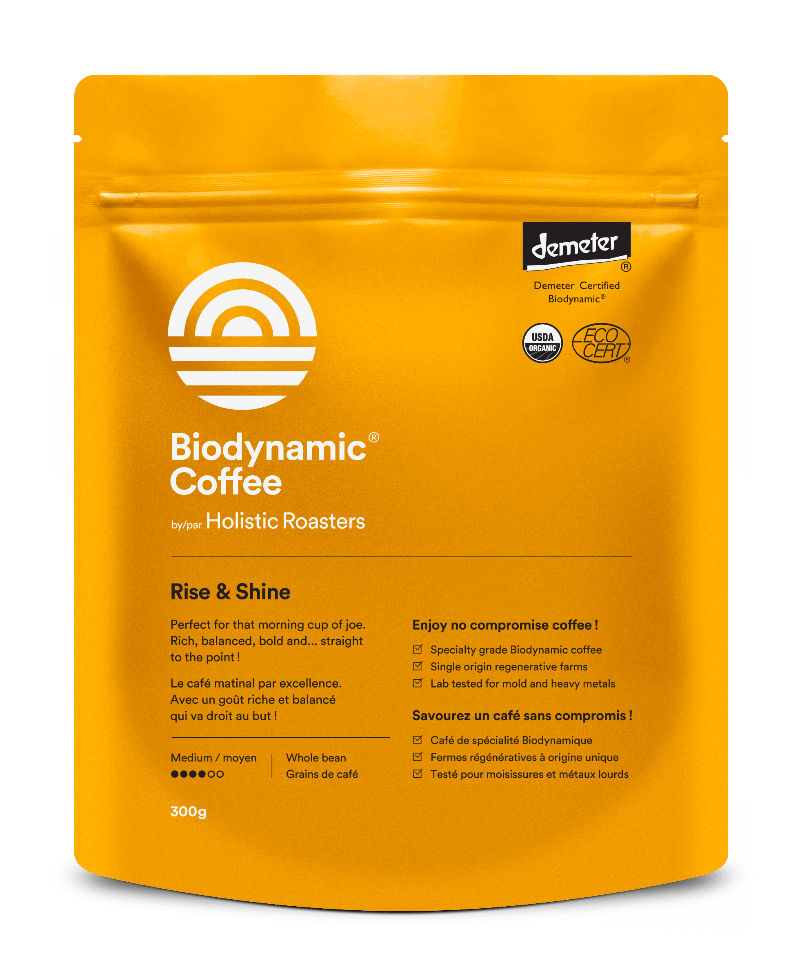Decaf Myths Busted: The Real Story Behind Clean, Premium Decaf Coffee
What You'll Learn About Decaf Coffee
- Introduction: Building on Clean Decaffeination
- Myth 1: All Decaf is the Same
- Myth 2: Decaf Has to Contain Harsh Chemicals
- Myth 3: Decaf Tastes Inferior
- Myth 4: Decaf Doesn't Offer Health Benefits
- Myth 5: Decaf Still Contains Lots of Caffeine
- Process Comparison: Chemical vs. Clean
- What's Coming Next
- Frequently Asked Questions
Not All Decaf is Created Equal
If you read our previous post, "Decaf, Done Right: What the Swiss Water Process Means for Your Cup," you already know that chemical-free decaffeination plays a major role in taste, cleanliness, and quality. Today, we're building on that foundation by tackling the biggest myths and misconceptions that have followed decaf for decades.
The truth is simple: not all decaf is created equal, and the right process makes all the difference.
The Bottom Line
This is the second part of our decaf series, designed to help you understand what separates clean, premium decaf from the rest. And as we prepare to introduce a truly one-of-a-kind Biodynamic-certified decaf, now is the perfect time to clear the air about what decaf really is—and what it can be when done right.

Myth 1: All Decaf is the Same
All decaf is the same
Decaf varies widely depending on how the caffeine is removed. There are multiple decaffeination methods commonly used in the coffee industry, and each affects flavor differently.
| Decaffeination Method | Process | Impact on Flavor |
|---|---|---|
| Methylene Chloride | Chemical solvent bonds with caffeine molecules | Can flatten sweetness, strip delicate notes |
| Ethyl Acetate | Naturally derived solvent extracts caffeine | May reduce complexity and origin character |
| CO2 Method | Supercritical carbon dioxide extraction | Effective but doesn't always preserve terroir |
| Swiss Water Process | Water, time, and temperature only | Preserves origin character, terroir, and flavor profile |
Solvent-based processes can flatten sweetness or strip nuance. The CO2 method can be effective, but it doesn't always preserve delicate origin characteristics.

The Swiss Water Difference
The Swiss Water Process stands out because it uses only water, time, and temperature to remove caffeine while protecting the coffee's identity, terroir, and natural flavor profile.
Our approach at Holistic Roasters has always been to choose methods that honor the farmers' work and preserve the unique character of every bean. The process matters, and your decaf choices should reflect that.
Myth 2: Decaf Has to Contain Harsh or Harmful Chemicals
Decaf has to contain harsh or harmful chemicals
This is one of the most persistent misconceptions about decaf coffee. Many people assume that chemicals are required, but this is not true.
Chemical-Based vs. Swiss Water Process
May leave trace residues
Can strip flavor compounds
Zero chemical residues
Preserves natural flavor

There are no chemical residues, no hidden solvents, and no shortcuts. Just clean, pure coffee.
This is why every decaf we offer is always chemical-free, clean, and aligned with our commitment to purity and regenerative quality.
Myth 3: Decaf Tastes Funny or Inferior
Decaf tastes funny or inferior
Decaf can taste bad, but only when it's made with poor processes or low-quality green coffee. Chemical methods can create off-flavors or remove the subtle aromatics that make specialty coffee expressive.
When caffeine is removed gently and naturally, flavor remains intact. Swiss Water Process decaf preserves the character of the beans, allowing notes of chocolate, fruit, florals, or spice to shine through.
Chocolate & Caramel
Rich, sweet notes preserved through gentle processing
Fruit & Citrus
Bright, complex acidity remains vibrant and clean
Floral & Delicate
Subtle aromatics stay intact without chemical interference
Herbal & Spice
Complex undertones shine through clean processing
At Holistic Roasters, we roast our decaf with the same level of care and craftsmanship as our caffeinated coffees. Decaf should never mean compromise.
Myth 4: Decaf Doesn't Offer the Same Health Benefits
Decaf doesn't offer the same health benefits
Coffee's well-known health benefits come largely from its antioxidants and polyphenols, not the caffeine. These beneficial compounds remain in the coffee even after the caffeine is removed.
Antioxidants
Decaf retains powerful antioxidants that help protect cells from damage and support overall health.
Polyphenols
These plant compounds remain intact, supporting cardiovascular health and reducing inflammation.
Minerals
Essential minerals like magnesium and potassium are preserved through the decaffeination process.
Beneficial Compounds
Cafestol and kahweol—beneficial plant compounds—remain present in decaf coffee.
This means that if you want the ritual and the health benefits of coffee without caffeine, you don't need to give anything up. Whether you choose decaf for sleep, hormone balance, pregnancy, or personal sensitivity, you can feel confident that decaf still delivers.
Who Benefits from Decaf?
- Sleep-conscious individuals: Enjoy coffee later in the day without disrupting sleep
- Pregnant or nursing mothers: Reduce caffeine intake while maintaining the ritual
- Those with caffeine sensitivity: Experience coffee's benefits without jitters or anxiety
- People managing hormone balance: Avoid caffeine's impact on cortisol and stress hormones
- Multiple-cup-a-day drinkers: Enjoy more coffee without excessive caffeine intake
Myth 5: Decaf Still Contains a Lot of Caffeine
Decaf still contains a lot of caffeine
No decaffeination process removes 100 percent of caffeine, but the Swiss Water Process comes very close. Swiss Water decaf is 99.9 percent caffeine-free.
Caffeine Content Comparison
In practical terms:
- A regular cup of coffee contains approximately 80 to 120 mg of caffeine
- A cup of Swiss Water decaf typically contains 2 to 3 mg of caffeine
- That's less than 3% of the caffeine found in regular coffee
For anyone avoiding caffeine for sleep, sensitivity, or health reasons, Swiss Water decaf is an excellent choice.
The Process Matters: Chemical vs. Clean Decaffeination
Understanding the differences between decaffeination methods helps you make informed choices about the coffee you drink every day.

| Aspect | Chemical Solvent Process | Swiss Water Process |
|---|---|---|
| Method | Uses methylene chloride or ethyl acetate | Uses only water, time, and temperature |
| Chemical Residues | May contain trace amounts | Zero chemical residues—100% solvent-free |
| Flavor Preservation | Can strip delicate flavor compounds | Preserves origin character and complexity |
| Caffeine Removal | 97-99% caffeine removed | 99.9% caffeine removed |
| Environmental Impact | Chemical waste requires disposal | Sustainable, water-based process |
| Certification | Limited third-party verification | Certified organic-compatible, traceable |
| Best For | Commercial, budget-focused applications | Premium, health-conscious consumers |
Why We Choose Swiss Water
At Holistic Roasters, we believe the process you can't see matters just as much as the cup you can taste. Swiss Water Process aligns with our values:
- Clean: No chemicals, no compromises
- Transparent: Every step is traceable and verified
- Regenerative: Sustainable and environmentally responsible
- Quality-focused: Preserves the work of farmers and roasters
What This Means for You—And What's Coming Next
If you care about flavor, origin integrity, regenerative agriculture, and clean processing, then understanding how your decaf is made is essential.
Our First Post: The Foundation
In "Decaf, Done Right," we explained why chemical-free decaf matters—the science behind the Swiss Water Process and how it preserves everything that makes coffee special.
This Post: Clearing the Myths
Today, we've shown that many of the assumptions about decaf simply aren't true when the coffee is sourced and processed with care. Great decaf is possible—it just requires the right approach.
What's Next: Something Unprecedented
At Holistic Roasters, we've spent years working with the cleanest decaffeination methods and the most regenerative farming practices. Now, we're preparing to combine these worlds in a way that has never been done before.
Something Special is on the Horizon
We're building toward the launch of a truly one-of-a-kind coffee: Biodynamic-certified decaf processed using the Swiss Water method. It represents the intersection of regenerative agriculture, clean processing, and uncompromising quality.
This is more than just another decaf—it's coffee done exactly the way it should be, from soil to cup.
Frequently Asked Questions
No. Decaf varies widely depending on the decaffeination method used. Chemical solvent processes (methylene chloride, ethyl acetate) can flatten sweetness or strip nuance from the coffee. The CO2 method can be effective but doesn't always preserve terroir.
The Swiss Water Process stands out because it preserves the coffee's natural flavor profile, terroir, and unique origin characteristics. Quality decaf made with clean processes can taste just as good as regular coffee—it's all about the method and the quality of the green coffee used.
No. The Swiss Water Process is 100 percent chemical solvent free. It uses only fresh water from the Coast Mountains of British Columbia, coffee, time, and temperature to remove caffeine.
There are no chemical residues, no hidden solvents, and no shortcuts. This is why every decaf we offer is always chemical-free, clean, and aligned with our commitment to purity and regenerative quality.
Decaf can taste bad when it's made with poor processes or low-quality green coffee. Chemical methods can create off-flavors or remove the subtle aromatics that make specialty coffee expressive.
When caffeine is removed gently and naturally using the Swiss Water Process, flavor remains intact. The process preserves notes of chocolate, fruit, florals, or spice—allowing the coffee's true character to shine through without any added aftertaste.
At Holistic Roasters, we roast our decaf with the same care and craftsmanship as our caffeinated coffees. Decaf should never mean compromise.
Yes. Coffee's well-known health benefits come largely from its antioxidants and polyphenols, not the caffeine. These beneficial compounds remain in the coffee even after the caffeine is removed.
Decaf coffee still contains:
- Antioxidants that help protect cells from damage
- Polyphenols that support cardiovascular health
- Essential minerals like magnesium and potassium
- Beneficial plant compounds such as cafestol and kahweol
Whether you choose decaf for sleep, hormone balance, pregnancy, or personal sensitivity, you can feel confident that decaf still delivers significant health benefits.
Swiss Water decaf is 99.9 percent caffeine-free. A cup of Swiss Water decaf typically contains 2 to 3 mg of caffeine, compared to 80 to 120 mg in a regular cup of coffee.
That means Swiss Water decaf contains less than 3% of the caffeine found in regular coffee. For anyone avoiding caffeine for sleep, sensitivity, or health reasons, Swiss Water decaf is an excellent choice.
While no decaffeination process removes 100 percent of caffeine, Swiss Water comes closer than any other method.
Biodynamic decaf combines the highest standards of regenerative agriculture with the cleanest decaffeination process available. It represents:
- Regenerative farming: Coffee grown using Biodynamic practices that heal soil and ecosystems
- Chemical-free processing: Swiss Water Process removes caffeine without any solvents
- Rigorous certification: Demeter Biodynamic standards are among the strictest in agriculture
- Complete traceability: Every step from farm to cup is verified and transparent
This combination has never been done before—and it represents our vision for what decaf can and should be.
References & Additional Reading
- Swiss Water Decaffeinated Coffee Company. "The Swiss Water Process." https://www.swisswater.com
- Ludwig, I.A., Clifford, M.N., Lean, M.E., Ashihara, H., Crozier, A. (2014). "Coffee: biochemistry and potential impact on health." Food & Function, 5(8), 1695-1717.
- Poole, R., Kennedy, O.J., Roderick, P., Fallowfield, J.A., Hayes, P.C., Parkes, J. (2017). "Coffee consumption and health: umbrella review of meta-analyses of multiple health outcomes." BMJ, 359.
- Urgert, R., Katan, M.B. (1997). "The cholesterol-raising factor from coffee beans." Annual Review of Nutrition, 17, 305-324.
- Esquivel, P., Jiménez, V.M. (2012). "Functional properties of coffee and coffee by-products." Food Research International, 46(2), 488-495.






